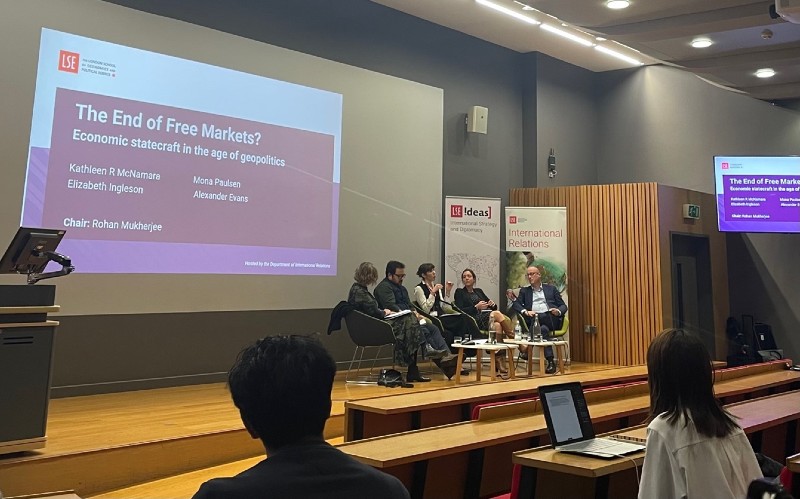On the 24 October 2024, a panel of experts came together to discuss the future of free markets in an era of shifting global geopolitics. The panel featured Kathleen R. McNamara, Professor of Government and Foreign Service at Georgetown University, Elizabeth Ingleson, Assistant Professor in the Department of International History at LSE, Alexander Evans, a policy strategist and Programme Director of the MPA in Data Science at LSE, and Mona Paulsen, Assistant Professor of Law at LSE.
Chaired by Rohan Mukherjee, Assistant Professor in the Department of International Relations at LSE, the discussion centred on whether recent US and EU industrial policies signal a reinvention of economic strategy amidst the geopolitical landscape.

L to R: Kathleen R. McNamara, Rohan Mukherjee (Chair), Mona Paulsen, Elizabeth Ingleson, Alexander Evans
Professor McNamara began by arguing that while free markets have always been embedded in political structures, recent crises—such as the Covid-19 pandemic and climate change—have intensified the perception that markets require active shaping by political forces. She emphasised that economic statecraft brings out the security implications of market restructuring. Policies like the Inflation Reduction Act in the US and investment in green technologies in the EU are now signs of a growing trend towards industrial policy aimed at specific national goals.
Focusing on security issues can undermine the role of trust and open deliberation that is meant to facilitate government cooperation in trade.
Dr Ingleson further highlighted the historical patterns of protectionism and nationalism resurfacing today, drawing comparisons to the late 19th century and illustrating how economic policies often shift in response to perceived threats to national stability. Professor Evans added a security-focused perspective, advocating for the importance of free markets in fostering innovation and choice, while acknowledging that security-driven economic interventions are gaining traction in political strategy. Finally, Dr Paulsen highlighted a key problem: Focusing on security issues can undermine the role of trust and open deliberation that is meant to facilitate government cooperation in trade.
In response to these varied perspectives, audience questions explored how emerging economies could navigate this shift, the role of the BRICS nations, the potential risks of weaponising economic tools like the US-dollar, and how middle powers might avoid taking sides in an increasingly polarised world. I also found myself considering how these dynamics will affect smaller economies that lack the resources to compete in either the geopolitical or economic sphere within the global arena.
The panel made a compelling case that while free markets have not disappeared, they are undergoing transformation in response to today’s global challenges.
The panel made a compelling case that while free markets have not disappeared, they are undergoing transformation in response to today’s global challenges. Whether this shift signals a new era of cooperative resilience or isolationist deglobalisation remains to be seen. In an ideal world, we would move away from a binary view of globalisation versus market intervention, and it was inspiring to observe that academics are pushing in this direction.
Event report by Jasmine Naami, MSc International Relations

This article represents the views of the author, and not the position of the Department of International Relations, nor of the London School of Economics.